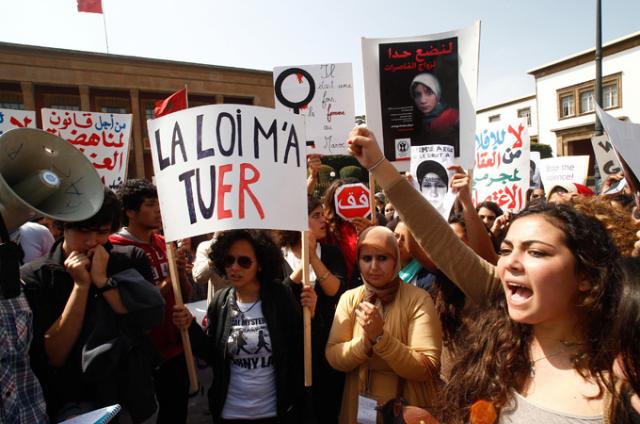Morocco to change rape marriage law
24th January 2014
The Moroccan government has said it plans to change a law that allows rapists to avoid charges if they marry their victims.
The move comes nearly a year after 16-year-old girl committed suicide after being forced to marry her alleged rapist.
Women's rights activists on Tuesday welcomed Justice Minister Mustapha Ramid's announcement, but said it was only a first step in reforming a penal code that does not do enough to stop violence against women in this North African kingdom.
A paragraph in Article 475 of the penal code allows those convicted of "corruption" or "kidnapping" of a minor to go free if they marry their victim and the practice has been encouraged by judges to spare family shame.

The suicicde of a teenager forced to marry her alleged rapist triggered protests and calls for legal reform [AP]
Last March, 16-year-old Amina al-Filali poisoned herself to get out of an abusive marriage to a 23-year-old she said had raped her. Her parents and a judge had pushed through the marriage to protect the family honour.
The incident sparked an outcry in Morocco and calls for the law to be changed.
While the marriage age in Morocco is officially 18, judges routinely approve much younger unions.
"Changing this article is a good thing but it doesn't meet all of our demands," said Khadija Ryadi, president of the Moroccan Association for Human Rights. "The penal code has to be totally reformed because it contains many provisions that discriminate against women and doesn't protect women against violence."
She singled out in particular parts of the law that distinguish between "rape resulting in deflowering and just plain rape".
Conjugal rape
The new article proposed on Monday, for instance, gives a 10-year penalty for consensual sex following the corruption of a minor but doubles the sentence if the sex results in "deflowering".
Fouzia Assouli, president of the Democratic League for Women's Rights, echoed Ryadi's concerns, explaining that the code only penalises violence against women from a moral standpoint "and not because it is just violence".
"The law doesn't recognise certain forms of violence against women, such as conjugal rape, while it still penalises other normal behaviour like sex outside of marriage between adults," she added.
Recent government statistics reported that 50 percent of attacks against women occur within conjugal relations.
The Justice Ministry at the time argued that al-Filali had not been raped and that the sex, which took place when she was 15, had been consensual. The prime minister later argued in front of parliament that the marriage provision in the article was, in any case, rarely used.
"In 550 cases of the corruption of minors between 2009 and 2010, only seven were married under Article 475 of the penal code, the rest were pursued by justice," Prime Minister Abdelilah Benkirane said in December.
While Morocco updated its family code in 2004, a comprehensive law combating violence against women has been languishing in parliament for the past eight years.
Social Development Minister Bassima Hakkaoui, the sole female minister in Cabinet, said in September she would try to get the law out of parliament and passed.


